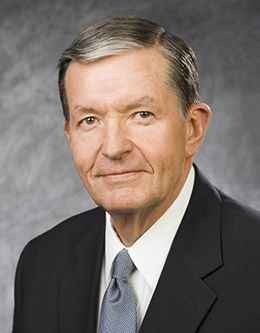All of you here today have had some significant participation in the achievements of the graduates we praise and extol in these exercises. Without equivocation, the graduates whose names and honors are found in the program of the day are central to our recognition. Yet none of them, impressive as they are, could have accomplished the achievements we celebrate without the contributions of so many others not specifically identified formally. We will mention some of the most important later in the program.
This graduating class of more than 6,000 is unique in particular characteristics and contributions. The age span of the class is broad, covering five decades. Over half of you are married, many of you have children, and the promise is that there are many more future BYU scholars yet to arrive on the mortal stage of your families. Whatever your personal situation or circumstance, know that we are proud of you and have great confidence in you and in your future lives and contributions.
While some of you have your careers and futures perfectly planned out—at least you might believe this to be the case—some of you are still exploring and wondering. For all of you, I can quite confidently predict that your experiences in the years ahead will be filled with a number of surprises, both pleasant and uncomfortable, as well as unexpected opportunities and challenges.
As the scriptures teach us, the plan of salvation is real, and each of us has a place in it. Because of the Atonement of Jesus Christ, which Lehi describes as the “intercession for all,” we will have the opportunity to “come unto God” if we do all that we can and must to qualify (2 Nephi 2:9, 10). These are basic principles that you have learned or had reinforced concurrently as you studied and mastered your major and other subjects here at BYU.
As part of all of this, we must never forget this potentially chilling doctrinal statement of explanation Father Lehi shared with his son Jacob: “For it must needs be, that there is an opposition in all things” (2 Nephi 2:11). This, coupled with the equally fundamental doctrinal blessing of individual and moral agency, helps us understand why not only what you have learned is important but perhaps even more so are the skill and facility you have developed in learning how to learn. Also implicit in your learning is knowing how to act in an increasingly changing and complicated world. The choices before you are perhaps more stark than ever before.
Lehi’s explanation continues:
Wherefore, the Lord God gave unto man that he should act for himself. Wherefore, man could not act for himself save it should be that he was enticed by the one or the other. [2 Nephi 2:16]
Let me promise you that you will be enticed or tempted now perhaps even more than you have been previously. You will face obvious decisions between good and evil, but you will also be challenged with judgments seemingly between several attractive options and situations when none of your choices will appear to be optimal. That is why you will need all the skill that you have acquired and then some to make the proper choices consistent with your individual plan of happiness, which must be entirely congruent with the Father’s general plan.
That is also why we speak regularly and broadly on this campus of the need to “seek learning, even by study and also by faith” (D&C 88:118). One of the blessings of your BYU experience is that you should be familiar with the promise of the Lord that “I will tell you in your mind and in your heart, by the Holy Ghost, which shall come upon you and which shall dwell in your heart” (D&C 8:2). I value the reminder given from time to time by President Boyd K. Packer that those who have received the gift of the Holy Ghost will not make a serious mistake without first being warned. Think often of that protection and that assurance.
As a certified Brigham Young University scholar, your life will be rich and can be very fulfilling. You will certainly encounter challenges, problems, difficulties, and vexing decisions as well as opportunities and privileges you have never imagined before. You are well equipped to deal with and benefit from all these experiences because of your tremendous native skills and talents—which have been enhanced and sharpened here at BYU—and particularly because of the blessings promised you through your faithfulness in honoring your covenants and in keeping God’s commandments.
As I commend you for your accomplishment, I also offer grateful commendation to those who have made your experiences and learning here possible. In this I include your families, the faithful tithe payers of the Church, our generous donors and benefactors, our remarkable faculty and staff, and everyone else who has done something to assist this great enterprise we call BYU in its progress forward. Let me also thank you graduates for what you have contributed to Brigham Young University with your attendance and prospectively for what you will yet do for your families, Church, university, and the world.
The gospel is true, and we are led today by living apostles and prophets, including one from whom we will hear today in this commencement exercise. We will pray for you always as we honor you today. In the name of Jesus Christ, amen.
© Brigham Young University. All rights reserved.

Cecil O. Samuelson was president of Brigham Young University when this commencement address was given on 22 April 2010.


